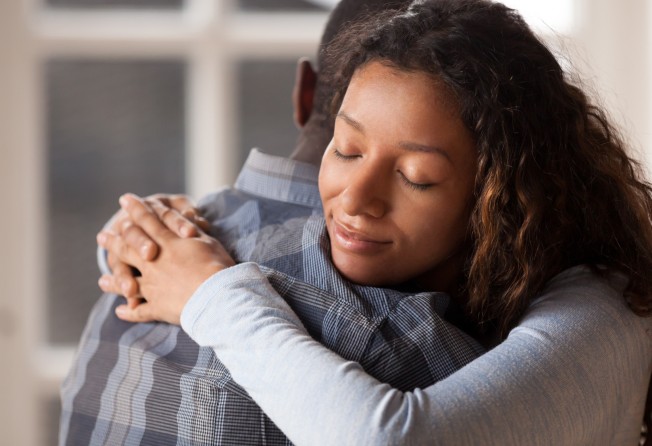
How to forgive yourself and why self-forgiveness helps us truly give love to others
- Self-forgiveness is about having a different understanding of yourself. Accept what you did wrong, learn from it, and communicate this to your partner
- Be mature enough to learn from your mistakes – we cannot have a healthy relationship with others if we don’t have one with ourselves first

Self-forgiveness is the biggest gift we can give ourselves, but it’s not an easy one to attain.
People who withhold self-love often find that they are constantly at war with themselves. So, when things go wrong in a relationship, it leaves them feeling unfulfilled and unloved.
Having the punishing feeling that we have done wrong things in the past makes it difficult to forgive ourselves. This self-punishment we inflict upon ourselves means we are constantly holding ourselves accountable, because we don’t want to repeat the same mistake that has hurt the people we love.
Unfortunately, this negatively critical mindset will not do us – or our loved ones – any good. On the contrary, it will make us feel disconnected. It also breeds insecurity, fear, self-rejection and self-hatred; these poisonous feelings stop us from finding true happiness and love. And rather worryingly, this mindset causes us to attract people and get into situations that reinforce our belief that there is something wrong with us and we are unforgivable.

Sonia Samtani, a clinical hypnotherapist, life coach, and relationship and wellness coach, explains what self-forgiveness means in a romantic relationship.
“It is moving beyond criticising yourself for things you did to accepting what you did, learning from it, creating a new way of being, and communicating it to your partner. It is operating from wisdom rather than ego. In other words, it’s approaching the relationship from a place of awareness and kindness towards yourself.”
Samtani says practising self-forgiveness lays the foundation for a conscious relationship where you can grow together. This will have an effect on both partners.
“You can only grow if you have the awareness to reflect upon your actions neutrally and ascertain whether something worked for you or not. If it did work, you continue down the same path. But if it didn’t work, you determine what you would do differently, and communicate your learning to your partner.”
When it comes down to it, self-forgiveness is about having a different relationship with yourself. It is having an attitude that presupposes you are doing the best you can, and you are willing to learn from the results. This growth within yourself is reflected in your relationships, so you need to ensure you are in a good place for the sake of your partner.
We cannot restore anything from a place that’s self-judging, and we cannot have a healthy relationship with others if we don’t have one with ourselves
Samtani stresses that self-forgiveness is extremely important in any relationship because you cannot change your actions of the past. “All you can do is understand why you did what you did, and if it doesn’t give your desired results then look for what you could have done differently.”
Self-forgiveness is a natural part of all healthy relationships. It takes us away from the pressure that all our actions have to produce desirable results and the inevitable disappointment that we will all face when they don’t.
“People who don’t practise self-forgiveness either feel extremely guilty about their actions or can’t face their actions and adopt avoiding behaviours. Both of these result in [creating] emotional distance in relationships,” Samtani says.
“It takes a high level of self-esteem and self-awareness to practise self-forgiveness. In doing so, you are accepting that on occasion your actions may unconsciously sabotage your relationship, and you are mature enough to learn from it.”

Samtani explains how forgiving oneself helps to strengthen or restore love.
“It helps to restore love because it has us face the truth with maturity, without deflecting it or punishing ourselves for it. This changes our attitude and enhances our ability to communicate with our partners as a rational and loving adult, rather than trying to defend ourselves or having to feel defeated all the time.
“In therapy, we say you are being the self-aware ‘adult’ who knows that you are enough, rather than undercompensating as the criticised inner child, or overcompensating as the rebellious inner child.”
As cliché as it sounds, Samtani says the only way we can truly give love to others is to first be loving to ourselves.
“We cannot restore anything from a place that’s self-judging, and we cannot have a healthy relationship with others if we don’t have one with ourselves,” she explains.
“The world we see outside us is a reflection of how we see ourselves. If we see ourselves as guilty, then our partners will reinforce that by judging us too. However, if we are loving to ourselves, our partners will also reflect back that compassion and appreciate that we are taking responsibility for our actions.”
And by forgiving ourselves, we are accepting ourselves more.
How to practise self-forgiveness
1. Shift your perspective from judgment to awareness by seeing your actions as choices and consequences, rather than right and wrong
2. Understand that it is not possible to only do things that are “right” all the time, and be compassionate to yourself when the results are different than intended
3. Take some time to reflect on the consequences of your choices and actions, and check if they are giving you your desired result or not
4. Shift the voice of your internal dialogue from critical to curious. Ask yourself questions like, “What can I learn from this?” rather than “How could I be so stupid?”
5. Place yourself in your mind and imagine yourself applying your learning in your relationship. Imagine how things could look different with your new action or attitude
6. Communicate your learning with your partner by taking responsibility for your actions without guilt. Tell them why you did what you did, what you’ve learned from it, and how you intend to operate differently going forward
Luisa Tam is a Post correspondent who also hosts Cantonese-language video tutorials that are now part of Cathay Pacific’s in-flight entertainment programme